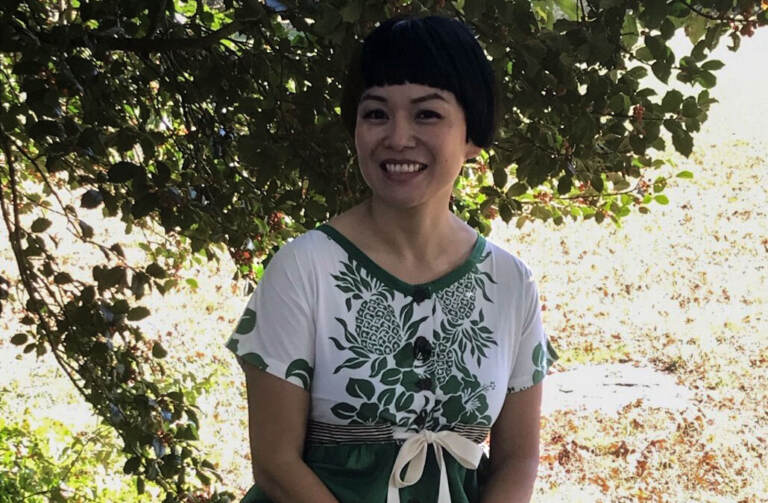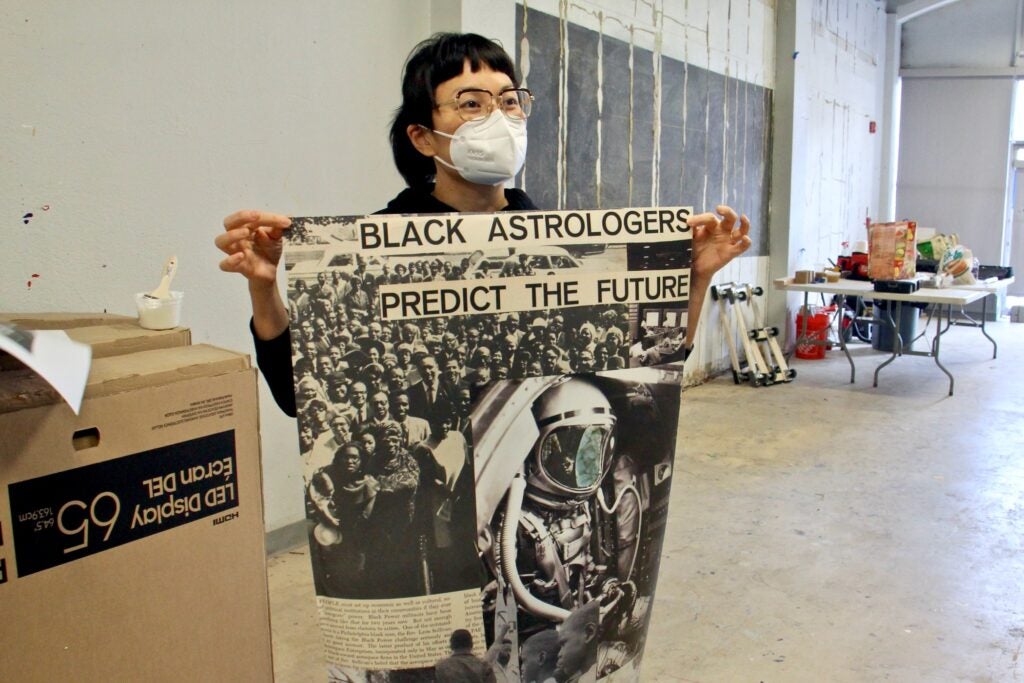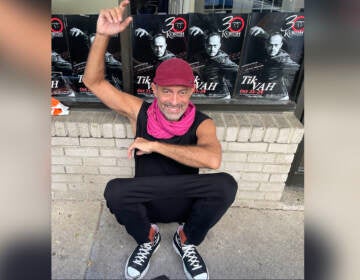Anne Ishii on her roles as writer, advocate, and now, host of WHYY-TV’s ‘Movers & Makers’
Anne Ishii spoke with WHYY’s “Morning Edition” host Jennifer Lynn about the new season and her dedication to leadership within the arts community and beyond.
Listen 6:40
WHYY-TV's "Movers and Makers" host Anne Ishii on location in Arden, Delaware.
WHYY’s arts and culture documentary show “Movers & Makers” returns for a fourth season Thursday night with a new host, Anne Ishii.
Ishii is a writer and executive director of the Asian Arts Initiative in Philadelphia. Now, she and the show’s Emmy Award-winning production team will introduce us to fascinating people and interesting places in the Philadelphia region. She spoke with WHYY’s “Morning Edition” host Jennifer Lynn about the new season and her dedication to leadership within the arts community and beyond.
Note: The following interview has been edited for length and clarity.
___
Congratulations. How do you feel about this new role?
I am so excited. I’m feeling like a little bit of a prom queen.
When I work on a new team, there’s that thrill of possibilities. Are you feeling that energy?
Absolutely. Let’s start with text messages through the night and into the morning. This is a very dedicated team — very vigilant, and diligent. And I think the most important thing to note about this is how much these independent producers have honored each other’s really unique perspectives that elevate information to the place of art. You’re going to see in each episode that there’s a really distinct perspective.
In this new season, we go to Arden, Delaware, an artist colony. It’s a wonderful place full of green space, very creative people. And they interestingly lease their land that they build their homes on. It’s a very intentional community.
SHOW EXCERPT, UNIDENTIFIED WOMAN: There are three separate communities: Arden, that was founded in 1900. Ardentown, which was founded in 1922, and Ardencroft, which was founded in 1950. We’ve heard it all. We’ve heard Arden is made up of hippies, of communists, of nudists. There might be some precedent for a lot of those things, but we’re not as crazy as it seems.
That was a clip from the new season of “Movers and Makers.” And what did you find so interesting about Arden, Delaware?
I think just how architecture has really integrated into nature, how that really creates a whole new creative environment and culture today. Because of the pandemic, we spend so much time outdoors and we can appreciate it. But, you know, 100 years ago, when it was being developed, to really have that deliberate relationship with the foliage, the kind of neighborliness that creates was really interesting to see.
At one point in this season, we revisit the dismantling of the Frank Rizzo mural in the city’s Italian Market section. That dismantling occurred just after the uprising in Philadelphia after the murder of George Floyd. This monument to Frank Rizzo, former mayor, former police commissioner of Philadelphia — he died in the early ‘90s, known for his strong-fisted enforcement of the law, especially in Black communities. He’s been called a racist. His family argues he is not a racist. What do we get out of this segment? It’s not just about the mural coming down.
There are so many cultural heroes in this region. We are not for lack of an opportunity to celebrate really amazing people. There’s a Harriet Tubman statue at City Hall right now, for example. And so, you know, the intent is really that the community wants heroes, right? So when we find out that we have potentially been honoring somebody whose story is checkered, I want to hear more about those new heroes, those overlooked heroes. And I think that’s something we did a really great job of in this episode.

Anne, you’re a publisher, a writer, a book promoter. You’ve written about gender and sexuality, about specialized Japanese comics. You grew up outside of L.A. in the ‘80s, a time of very intense cultural, racial, and economic circumstances. Your father is Japanese, your mother, Korean. Tell us about the writer Anne Ishii.
I think everything you just named has contributed to my identity as a writer. The English language always felt a little bit unfamiliar. Growing up, I learned it simultaneously with Japanese. I think for anybody who identifies as part of an immigrant diaspora, writing becomes a really powerful, emancipatory tool to prove that you matter and that you belong in a community. I write to include myself in a larger story.
You recently wrote about anti-Asian hate, and I wonder how as a leader in the arts community in Philadelphia, how you have processed actions against Asian Americans, against Asians, that picked up during the pandemic.
As an arts leader and a writer and an artist, my priorities are always around craft and creating space for more visibility and culture. But during social crises, my responsibilities are exclusively toward my community. I think the most important thing I was able to do in the last couple of years was really to remind everybody in the Asian diaspora and the Asian community that you’re allowed to be whoever you need to be. These social crises aren’t what dictates what kind of identity we need to establish as victims, as survivors, as leaders, as recluses. I mean, if you decide to opt out of the conversation, that’s OK, too.

Saturdays just got more interesting.
WHYY is your source for fact-based, in-depth journalism and information. As a nonprofit organization, we rely on financial support from readers like you. Please give today.






